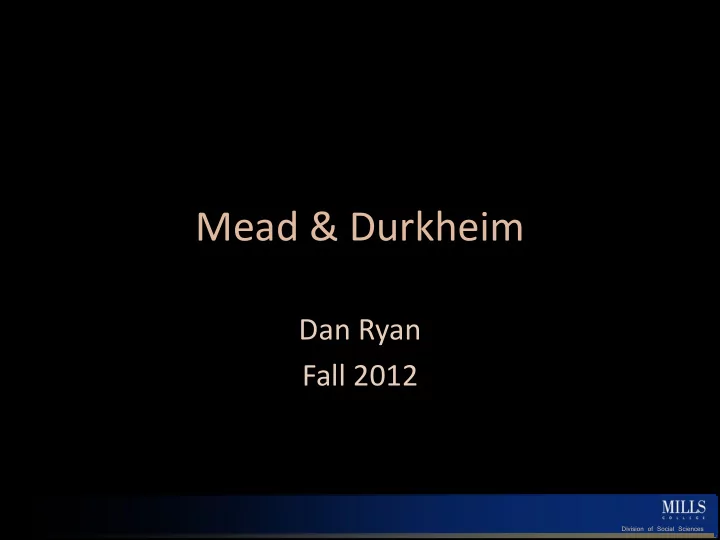

Mead & Durkheim Dan Ryan Fall 2012 Division of Social Sciences
George Herbert Mead • 1863–1931 • University of Chicago • Associated with Pragmatism – John Dewey – Charles Sanders Peirce – William James • Main work: Mind, Self and Society – Mind and self emerge from the communication and interaction between organisms
• Isolated self • Encounter other • Take role of specific other • Game: multiple others & their inter-relations • Generalized other • Multiple groups and categories • Group generalized other
“This is my property…” Not an attempt to make you understand me • “There is a thing called property” • Just idea, but real for “us” “here” “now” • Others “People” would back me up • Full self as full group member gives individuals access to such • supra-individual realities We are constrained by them and they enable us to guide and • constrain others "The structure, then, on which the self is built is this response • which is common to all, for one has to be a member of a community to be a self" (65.8)
“This is my property…” • Full self as full group member gives individuals access to such supra-individual realities • We are constrained by them and they enable us to guide and constrain others • "The structure, then, on which the self is built is this response which is common to all, for one has to be a member of a community to be a self" (65.8)
Mead Individuals Social Order shared meaning Concrete Isolated Generalized Individual Coordination Cooperation Self Other Others
Durkheim • 1858-1917 • Division of Labor in Society (1893) – Discovery of “society” and “solidarity” • Rules of the Sociological Method (1895) – How to do it. Social facts. • Suicide (1897) – Look what you can do with my method!
Totemism • Kind of religion • Association of kinship and natural object • "The totem is above all a symbol…of something else, but of what? (49.8) • Totem is symbol of "god" and of the clan. Perhaps because god and society are same?
How did this apotheosis happen? (50.3) • By its effect on the mind, society is sort of like a god. – Experienced as superior to one's individual self – Experienced as something I depend on – Social aims not always my aims – Society can only act through me – I am constantly subject to constraints put on me by society – In its success at doing that I recognize it has power (moral superiority) over me (50.7) – Has power "irrespective of any utilitarian calculation"
How did this apotheosis happen? (50.3) • Social rules (norms) have a special respect due them (51.1) • Thinking about social rules, we think about others thinking them. "Voice in my head" is not MY voice. This multiplies their intensity. • When we act to enforce social norms we do so "on behalf of us all" - the IMPERSONAL nature of it adds to its force. • "radiation of the mental energy it contains" (51.6) • Moral authority distinctive b/c it gets power from psychic properties alone. • Even faith in science depends on collective opinion about science. • Social pressure feels external (52.1)
Durkheim’s Project • In previous work – "the social" as sui generis order – solidarity, connection to society – social facts – comparison as a method
Durkheim’s Project • Observation: Science and rationality come to be dominant but religion does not disappear? Are people just silly? No, it seems “real.” • Research Question: What is religion? • Strategy: Compare and contrast known religions to uncover fundamentals.
Results: What shows up consistently? Beliefs • – Most religions divide the world in to sacred and profane. Sacred = special, profane = all the rest. • – Some notion of soul, spirits, mythical personalities, divinity Actions • – negative cult – rites of oblation (sacrifice/offering) and communion (joining, oneness) – imitative rites (ritual in usual sense) – commemorative rites (re-enacting past) – expiatory rites (expressing atonement) Conventional (scientific) Wisdom: religion is an unreal system of beliefs • and practices. But, real people seem to get something real from it. Can they all be bamboozled? Can you dismiss religion just because you do not believe in it?
So, how might it work? • Can just thinking/believing generate results? • Most religions require you have to do stuff. – Cult and ritual. – Often a "negative" cult - not doing things. • Durkheim's insight – The evidence of the reality of the beliefs is generated by the activity.
Logical Challenge • Practices vary wildly. Which one is “it”? • Answer beyond any particular practice. • RELIGION is real, but no particular religion is the source of its real effects. • The answer is that "the universal and eternal objective cause of these sensations sui generis out of which religious experience is made, is society ."
Durkheim Individuals Social Order shared meaning Collective Group Life Ritual Coordination Cooperation Representations
Individuals Social Order shared meaning Durkhe heim Collective Group Life Ritual Representations Coordination Cooperation Mead Concrete Generalized Isolated Individual Other Self Others
Recommend
More recommend